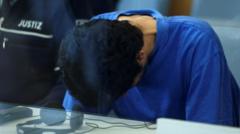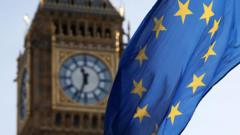The late pope's impact on the Catholic Church and social justice issues remains a focal point as his successors are set to be chosen.
Pope Francis' Funeral: World Leaders Unite to Honor His Legacy

Pope Francis' Funeral: World Leaders Unite to Honor His Legacy
As Pope Francis prepares for his upcoming funeral, tributes and memorials pour in from around the globe.
As the world mourns the passing of Pope Francis, his funeral is set to take place on Saturday at St. Peter’s Basilica in Rome, following a heartfelt period of mourning. Attendees from across the globe, including leaders such as President Trump and Ukrainian President Volodymyr Zelensky, are anticipated to honor his enduring legacy during the service. This has evoked sympathy, reverence, and discussions on the future of the Catholic Church post-Francis.
Francis' funeral rites will reflect his humble approach to leadership, prearranged under his guidance to ensure simplicity and authenticity were maintained. His body was displayed in an open coffin dressed in traditional vestments, holding a rosary, emphasizing his belief in accessibility and a bond with the people. Starting Wednesday, a three-day lying in state is scheduled, allowing the public to pay their respects.
Meanwhile, tributes have emerged worldwide, with memorial services held in various major cities. National flags are flown at half-staff, and official mourning has begun in countries like Italy and Argentina, where many view Francis as a national hero. International leaders highlight Francis' fortitude in advocating for marginalized populations, a stance that often happened in direct opposition to political figures attending his funeral.
The process for selecting a new pope will commence shortly after the funeral, underlining the significance of Cardinal Giovanni Battista Re, the dean of the College of Cardinals. The conclave will bring together 135 cardinal electors who will convene to determine the direction of the Catholic Church's future, a pivotal moment underscored by the urgency of the changes in global socio-political climates.
Francis passed away following a cerebral stroke at the age of 88 on Easter Monday, a date rich with symbolism for the Catholic community. His will expressed a desire for a modest burial at the Papal Basilica of St. Mary Major, emphasizing simplicity, a trait that defined his papacy.
Amidst the memorials and the preparations for his successor, discussions continue about whether Francis will be regarded as a saint. His tenure saw the canonization of numerous saints, including renowned figures such as Mother Teresa, articulating his commitment to social justice and inclusivity. The mosaic of Francis' legacy is painted with love, humility, and a challenge to continually uplift those in need.
As countries unite in celebration of his life, the world reflects on the diverse nuances of Francis' contributions to the Catholic Church and the broader global community.
Francis' funeral rites will reflect his humble approach to leadership, prearranged under his guidance to ensure simplicity and authenticity were maintained. His body was displayed in an open coffin dressed in traditional vestments, holding a rosary, emphasizing his belief in accessibility and a bond with the people. Starting Wednesday, a three-day lying in state is scheduled, allowing the public to pay their respects.
Meanwhile, tributes have emerged worldwide, with memorial services held in various major cities. National flags are flown at half-staff, and official mourning has begun in countries like Italy and Argentina, where many view Francis as a national hero. International leaders highlight Francis' fortitude in advocating for marginalized populations, a stance that often happened in direct opposition to political figures attending his funeral.
The process for selecting a new pope will commence shortly after the funeral, underlining the significance of Cardinal Giovanni Battista Re, the dean of the College of Cardinals. The conclave will bring together 135 cardinal electors who will convene to determine the direction of the Catholic Church's future, a pivotal moment underscored by the urgency of the changes in global socio-political climates.
Francis passed away following a cerebral stroke at the age of 88 on Easter Monday, a date rich with symbolism for the Catholic community. His will expressed a desire for a modest burial at the Papal Basilica of St. Mary Major, emphasizing simplicity, a trait that defined his papacy.
Amidst the memorials and the preparations for his successor, discussions continue about whether Francis will be regarded as a saint. His tenure saw the canonization of numerous saints, including renowned figures such as Mother Teresa, articulating his commitment to social justice and inclusivity. The mosaic of Francis' legacy is painted with love, humility, and a challenge to continually uplift those in need.
As countries unite in celebration of his life, the world reflects on the diverse nuances of Francis' contributions to the Catholic Church and the broader global community.






















